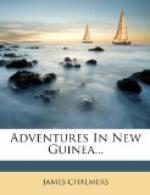I should have visited Kalo, but was afraid of compromising the mission, as it is possible the natives may be punished for the outrage. I fear we are not altogether free from blame; the teachers are often very indiscreet in their dealings with the natives, and not over-careful in what they say; there has also, perhaps, sometimes been a niggard regard to expense on our part. A very few pounds spent at a station like Kalo in the first years would, I believe, prevent much trouble, and probably murder. The Kalo natives felt that Hula and Kerepunu got the most tobacco and tomahawks, and that their share was small indeed. Instead of our buying all the thatch required for the other stations—only obtainable at Kalo—we got the teachers, with their boys, to get it. We meant it well, to save expense. My experience teaches me to throw all I can in the way of natives not connected with our head station. At this station—Port Moresby—for the next few years the expenses will be considerable in buildings, laying out the land, and in presents to the constant stream of visitors; but it will have a Christianizing and a civilizing effect upon a large extent of country.
On the 24th of May, 1881, left Port Moresby in the Mayri, and, having taken on board four natives at Boera, continued a westerly course, anchoring next day in Hall Sound, opposite Delena. Early on the morning of May 26th, Kone and Lavao, our old friends, came off. They say it is useless going to Maiva, as we cannot land; but we can go and see for ourselves, and they will accompany us. I had to land to eat pigs, i.e., receive pigs and hand them over to my followers. On landing, they led me up the hill at the back of village, where I was astonished to find a fine tract of land forming a splendid position for a house. Kone at once offered me as much land as I wanted. After thinking it over on board, I decided on building. I landed tents, and pitched them on the rise above the village. My experience is that places quite exposed to south-east wind are more unhealthy than swampy country. On Rarotonga there were more deaths on the windward side of the island than on the leeward.
On the Sunday after landing, we went down and had service in the village. Kone interpreted into Lolo. When telling the people we had no work for them on Sunday, Kone said: “Oh! we know, and we, too, are going to be helaka (sacred) to-morrow.” I asked him, “Come, Kone, how do you know?” “From Boera.” I met a lad repeating the Lord’s Prayer in Motu, and found he had been taught by Piri. The Motu tribe has already had great influence, and will have more and more every year. I have an interesting class of children, and hope, before we leave, they will know their letters well.
What nonsense one could write of the reception here—such as “Everybody at service this morning listened attentively; commented on address or conversation; children all come to school, so intelligent, and seemingly anxious to learn; and, altogether, prospects are bright.” At home they would say, why, they are being converted; see the speedy triumph! Alas! they are but savages, pure and simple, rejoicing in the prospect of an unlimited supply of tobacco, beads, and tomahawks.




